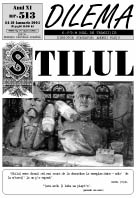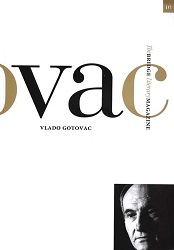Is There a New Diplomacy in the Latter Half of 20th Century?!
The change of the international system and one of its direct results: a change in the nature of diplomacy. Towards a new corporative society?!
More...We kindly inform you that, as long as the subject affiliation of our 300.000+ articles is in progress, you might get unsufficient or no results on your third level or second level search. In this case, please broaden your search criteria.
The change of the international system and one of its direct results: a change in the nature of diplomacy. Towards a new corporative society?!
More...
After the 1989 revolution, the new leadership of Romania is doing special efforts in order to find new structures for the society, structures that could handle the political. economical and social changes we are facing. They proclaim quickly their adhesion to the principles of decentralization and local autonomy. This choice comes out more as an external constraint then as a national debate and a change of mentality inside the society. Because of this, there are special problem that resulted from an early adoption of an external model without considering the real estate of facts in the society. There is no doubt that these changes are very necessary in order to find effective structures able to take to an end the steps for European integration. But this process is not easy at all, the old structures proving themselves not able to adapt smoothly to these transformations. New structures are needed, while others would have to be cut off. There will be a need for new social actors and new relations between them. That is why a redistribution of competence and power in territory can be foreseen, and new projects are necessary in order to reshape the territory affected by previous unsuitable strategies. At the same time, appear new actors and is increased their position. This fact will cause new social relations, often conflictual, and a new restructuring of the power. These all will lead to the creation of new territories as a consequence of the competition between different plans concerning the territory.
More...
Throughout all its history Europe was tormented by many wars. At the eve of 21st century we can hope for a more peaceful future. This work is concerned with the European security framework seen by a national point of view, that of Romania.
More...
Today’s Europe is a category not of being, but of the spirit and does not have frontiers for human values and thoughts. Bernard-Henry Levy used to say "Europe, and this cannot be repeated often enough, is not a place, but an idea."
More...
Le traité d’Amsterdam, signé le 20.10.1997 mais non entré en vigueur jusqu’à la ratification par tous les Etats membres, apporte beaucoup de changements tant aux Communautés Européennes qu’aux deux autres piliers de l’Union, les uns étant bons sans être vraiment indispensables, les autres étant "mauvais" en ce sens qu’ils ont été mal conçus et/ou rédigés. Les changements sont moins spectaculaires concernant les institutions, sauf l’extension du contrôle de la Cour de Justice, en revanche certains sont remarquables en ce qui concerne les compétences de l’Union et autres aspects liés au développement de ses piliers. Toutefois, ce qui était attendu de la part des Etats – c’est-à-dire l’amélioration du fonctionnement des institutions – a été reporté pour la prochaine éventuelle conférence de révision, une modalité malheureuse d’éviter d’affronter maintenant un problème qui, pourtant, ne cesse pas d’exister. Il est à espérer qu’un éventuel élargissement de l’Union obligera les Etats membres à accomplir une réforme nécessaire, réforme qu’ils ont refusé aujourd’hui d’accomplir.
More...
L’article traite quelques aspects liés ´ l’activité scientifique et academique de la madame professeur docteur Chantal Millon-Delsol, doyen du Centre d’Études Européenes de l’Université Marne la Vallée, ´ l’occasion de la decernation du titre Doctor Honoris Causa de l’Université "Babes-Bolyai", ´ la proposition de la Faculté des Études Européenes (le 25 septembre 1999).
More...
An outstanding personality of the Italian political life, Alcide De Gasperi was through the essence of his thinking a follower of the democratic-Christian doctrine, an adherent to ecumenism and Catholic universalism, completed in time by a Europeanist conviction and federalist accents. The nuancing of De Gasperi’s involvement in the fight for European integration leads to the finding of his transition from "a simple observer of a problem that did not seem to be topical for Italy to his decision of supporting European unity".
More...
Questo saggio metterà in luce la vita e l'attività politica di Altiero Spinelli, l'autore del Manifesto di Ventotene, il testo fondamentale del federalismo europeo. Insisterò sul fatto che nel Manifesto vengono enunciati non solo i presupposti ideologici, ma anche gli strumenti costituzionali dell'unificazione europea, e si formulano due dei principi fondamentali della lotta per l'Europa. Nel mio saggio seguirò l'attività di Spinelli cominciando con la sua attività clandestina antifascista e poi con il suo arresto e la sua detenzione a Roma, Viterbo, Civitavecchia accordando un valore più grande agli anni del confino di Ventotene e alla nascita e l'attività del Movimento Federalista Europeo. Concluderò il mio saggio con la Conferenza federalista di Parigi, dopo quale, abbastanza subito, Spinelli deluso del fatto che il movimento federalista rimane un movimento di minoranze abbandona temporaneo la sua militanza politica, quale sarà ripresa più tardi, con il suo impegno nella Commissione Europea e nel Parlamento Europeo.
More...
The main argument of my essay is focused on the relation between the post-modern concept of cultural identity and our common intellectual history in Europe. Thus, I wish to begin with a short commentary on the post-modern condition of our sensibility that was changed under the impact of the cybernetic revolution of our times. Hence, I will ask myself, from a mere cultural point of view, which is the content and the meaning of EUROPE and what present identity is supposed to have. The first conclusion is that through the new globalised pattern of "media-culture" we can hardly speak about an actual European identity, since a general process of cultural homogenisation annihilated its heritage and memory. Secondly, I will mention the major consequences of the contemporary indifference towards the meaning of the question (philosophy) and regarding the mystery of redemption (theology), emphasising the fundamental risk of losing the experience of self-comprehension.
More...
La Conferenza ministeriale tenutasi a Barcellona nel novembre del 1995 inaugurò una nuova tappa, per altro radicalmente innovativa, delle relazioni euro-mediterranee. Il partenariato euro-mediterraneo, lanciato in quella sede, avrebbe dovuto costituire un quadro privilegiato di dialogo multilaterale e di cooperazione globale tra i quindici Stati membri dell’Unione Europea e dodici paesi terzi mediterranei (Marocco, Tunisia, Algeria, Egitto, Israele, Autorità palestinese, Giordania, Siria, Libano, Turchia, Malta e Cipro). L’obiettivo ultimo, di certo ambizioso, sarebbe dovuto essere quello di fare del Mediterraneo un’area di pace, stabilità e prosperità condivisa. Tuttavia, a distanza di quasi sei anni dal lancio di tale iniziativa, si deve purtroppo constatare la debolezza del processo e l’avvenuto ridimensionamento degli obiettivi fissati. L’analisi dell’andamento della cooperazione in materia politica e di sicurezza illustra chiaramente la fragilità del partenariato nel suo complesso e la natura degli ostacoli che maggiormente impediscono la piena realizzazione del progetto iniziale.
More...
Earlier versions of this paper were presented at the World Congress of the International Institute of Sociology in Krakow, Poland, July 11-16, 2001 and the Institute of Political Studies and International Relations, State University of Moldova, Chisinau, October 22, 2001. This version was presented at the Faculty of European Studies, Babes-Bolyai University, Cluj-Napoca, Romania, October 25, 2001.
More...
‘ What’s time? If you hadn’t asked, I would have known. Since you’ve asked me, I’m not quite sure, any longer’, said St. Augustin. When it comes to define ‘institutions’ the political scientists found themselves in the same situation. The institutions are used almost everywhere: from the studies of the origin of the state to the discussion of corporatism; from the literature on legislatures to the analysis of the breakdown of democratic regimes; from the congressional studies to the modernizing of the intellectual transformation; and so on . Because of its ambiguity, the concept of institution became such a big umbrella that almost everything seems to fit in. Being so, it is no surprise if practically every political scientist would agree with such a statement as ‘institutions matter’.
More...
Magdalena Boiangiu suggests that the plan to continue to discriminate on the basis of acquired characteristics, like race or gender, is weakening in USA universities. The strategy is to select people using the same acquired characteristics that originally brought disadvantage and, by giving them special consideration, turn that acquired characteristic into a compensatory advantage. It is, in effect, using racism to combat racism, sexism to contest sexism.
More...
Cristian Ghinea writes about the new proposition, made by SDP (the Party of Social Democracy, the leading party in Romania) concerning the uninominal vote. The journalist tries to see if such a change can be made and can be used properly by the electors in order to produce some real qualitative changes in the Romanian political life.
More...
Goethe Institute organized a symposium about Jewish identity in Europe. Nicolae Cajal, Mihai Răzvan Ungureanu, Lya Benjamin, Ladislau Gyémant, Smaranda Vultur are some of the persons who took part in the discussions hosted by Heidegert Hoesch. Magdalena Boiangiu makes some comments about this significant cultural event.
More...


